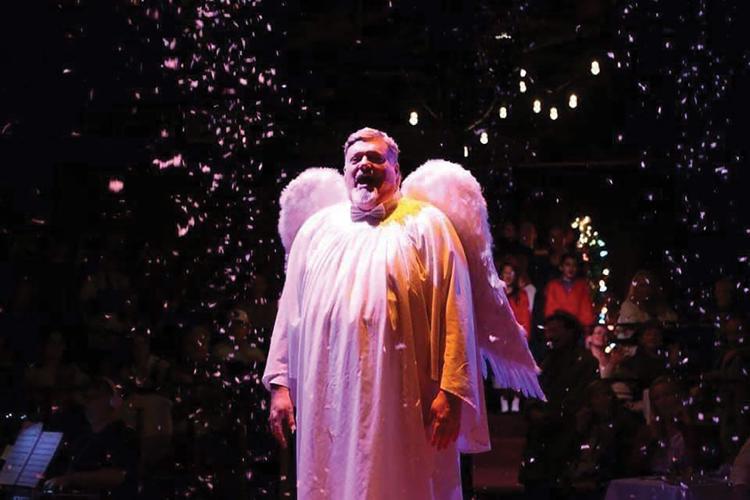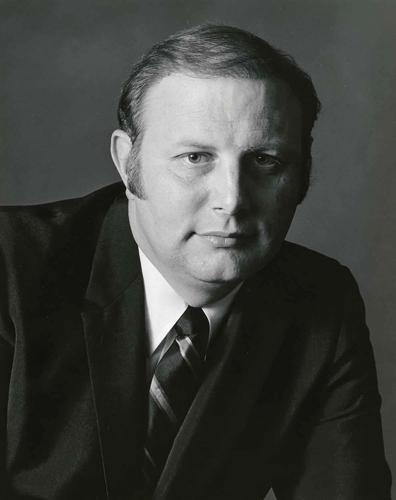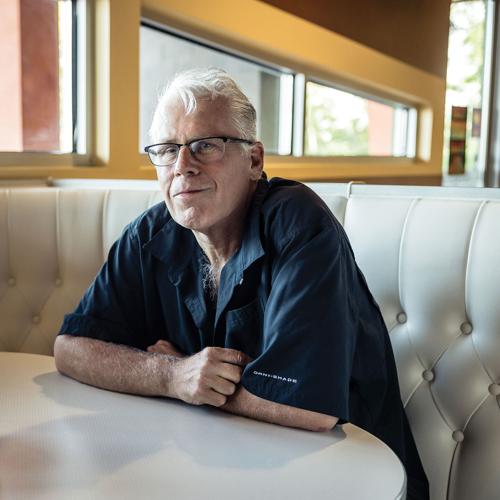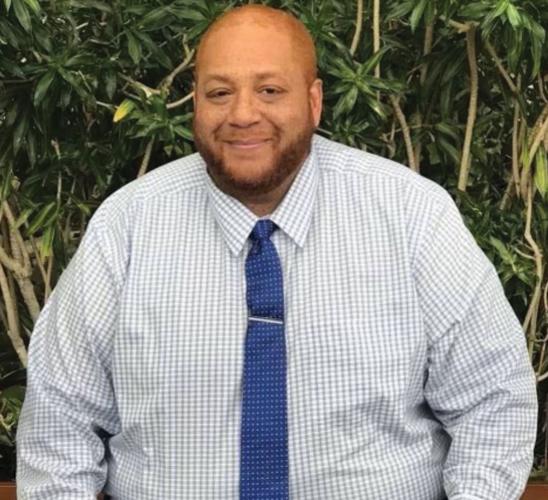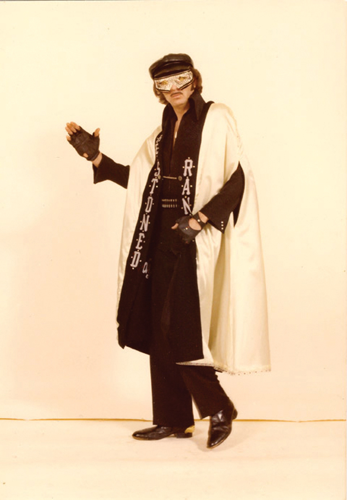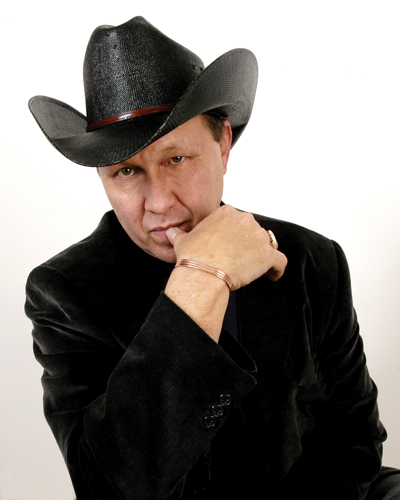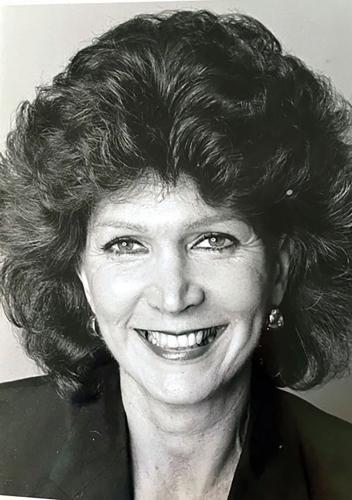Richard Griffin
Master musician, teacher, mentor
As a young man, Erie, Pa., native Richard Griffin served in the U.S. Army and performed with the U.S. Army Band. He continued his service with the 129th Army Band, attached to the Tennessee National Guard; he was a drum major and led the Jazz Ensemble. Over more than two decades as an instructor at Nashville School of the Arts, Griffin taught many, many young musicians essential skills in music theory, as well as instrumental performance in a variety of group settings, including the school’s Jazz Band and Pop and Classical ensembles.
Not all of Griffin’s former students became professional musicians, but those who took that path contribute to a staggering variety of traditions and genres. A few of them who happen to be among the producers and instrumentalists shaping the sound of hip-hop in Nashville shared their memories of Griffin with the Scene. They reflect on the way his commitment to excellence was built around nurturing them as growing young people.
“If we got a note wrong, he would fix that note with us,” recalls tenor sax player and teacher Austin Willé. “And he would always tell us, ‘All right, we fixed that note, don’t mess that note up again. Mess something else up!’ [Laughs] … That’s where that father-figure-ness came in, because he really made you feel like he was your guide, your protector in the realm of music — anything that he taught you would be something that would not fail you in the real world of music, and that was big.”
Griffin died July 5 at age 69, leaving behind his family and an extensive network of friends, colleagues and students. But his influence seems nearly boundless.
“[He] really gave us the confidence and the esteem within ourselves to put on our own shows far after high school, and look to each other for support and help in building a great show,” says Chazen Singleton, Willé’s onetime classmate and sometime bandmate. Singleton credits Griffin with encouraging him to make the jump to tenor sax, his main instrument today. “Every time I picked up my horn, especially if there were times of nonpractice, I would go back immediately to the fundamentals that he taught me in order to learn to play again — or at least play correctly. So there’s a communication with him any time you touch your instrument.” —Stephen Trageser

Liz Thiels
Liz Thiels
Country publicist extraordinaire, early Exit/In co-owner
A pillar of Nashville’s live music scene and a boundary-pushing publicist, Liz Thiels passed away on March 19 at age 78, following a long illness. After moving to Nashville in the late 1960s, Thiels established herself as a powerful force in the country music industry. She was one of the storied club Exit/In’s co-owners during its early years, launched the city’s first Nashville-specific music publicity firm and had a long, deeply impactful relationship with the Country Music Hall of Fame and Museum.
Thiels was born in Alexandria, La., in 1944, and studied advertising at the University of Southwest Louisiana and Louisiana State University. A few years after she arrived in Music City, she helped get Exit/In off the ground and grow into one of the city’s most revered venues. In 1979, Thiels established publicity business Network Ink, whose eye-popping client roster included Guy Clark, Reba McEntire and WSM. Her work with the Hall of Fame began when she assisted with its move to its current location in 2001. She took the position of vice president for public relations in 2002, and her tenure extended into the next two decades as she helped chart the course for the institution’s current success. In addition to everything else Thiels leaves behind as a legacy, the avid gardener was honored with the establishment of the Liz Thiels Hillbilly Garden, which grows herbs used by the museum’s restaurant. —Brittney McKenna

Frank Sass
Frank Sass
Soundman extraordinaire
I first met Frank Sass not long after I moved to Nashville in 1997. It was one of my first shows in town, with Grateful Dead tribute band Dead Set at Exit/In, sometime in the late ’90s. He was busting everyone’s chops (including mine, and he’d never met me), making wisecracks and running the soundcheck like boot camp. And when it came time to start the show, he signaled he was ready by flipping the bird.
In my early days as an inveterate Yankee in relatively polite and irony-free Music City, my attempts at playful sarcasm were often met with blank stares. Meeting (and bantering with) Frank was a breath of fresh air, one of the first times I really felt like I might belong in Nashville.
After that first soundcheck, Frank and I talked for quite a while, about my time in New York City (he was a native of Kingston, N.Y.) and all sorts of stuff. I told him how he was one of the first people I’d met in town who really made me feel at home. We didn’t hang out outside of shows, but between performing and seeing other bands, I would see him at least a couple times a month, and we’d chat as he worked his mixing magic behind the soundboard.
I worked with Frank later at The Rutledge and elsewhere, and always felt like I was seeing a long-lost brother. I didn’t see him as much as the years went on, though I did get to hang with him a few months back at the fabulous fundraiser for him at Eastside Bowl. He looked pretty good, his attitude seemed great, and I was wondering if maybe he had his illness on the ropes. Sadly, that wasn’t the case. Frank died on Nov. 28, and the number of tributes in my Facebook feed rivaled that of some of the biggest Nashville music legends who have passed in recent years. I just hope he knew how beloved he was. —Jack Silverman
Kenny Highers
Keeper of the door
Everyone involved in putting on a show at a small-to-midsize venue is playing an important role in that music community — especially the folks working the door. Their ability to read people (and sometimes lips) and knack for curbing nonsense without being jerks (unless they need to be) keeps these spaces safe and welcoming. For more than two decades, fans, staff, musicians, scenesters, journos and other hangers-on at historic rock club Exit/In relied on Kenny Highers to set the tone for the whole night out.
A seemingly endless parade of punks, heshers, backpacker rappers, poets, urban cowfolk, dosed EDM kids and more passed through the portal kept by Highers, his gentle smile and his 6-foot-6-inch frame. We never talked much more than to say hello, but he was an integral part of concerts I’ll remember for the rest of my life — from Shuggie Otis to JEFF the Brotherhood and beyond — which shaped my idea of what a music scene can be. Highers grappled with complications from diabetes beginning at age 10, but never seemed to let it sour his disposition or diminish the fullness of his life. He died Jan. 10 at age 50, leaving behind friends, family and a music scene that was all the richer for having had him in it. —Stephen Trageser
Sonatore
Passionate artist, devoted friend
This year, Nashville’s underground scene lost one of its brightest stars. Alex Sonatore Michael Cheng was a one-of-a-kind listener, artistic translator, son, brother, friend. Born and raised in Nashville, he attended Hillsboro and Hume-Fogg High Schools, Shanghai American School in China, and Belmont University. Before his own passing, he spent extensive time as a caretaker for his mom and buried her in Kaohsiung, Taiwan.
Under the moniker Sonatore, he created his ethereal and prolific photography and music, forever lent to us. He always self-described. Film-based photographer. Noisy emo avant-pop musician. Dream traveler. Loved ones characterize him as self-actualizing at thirty-one, launching his life and art in continued promising and novel directions. He loved to travel. He showed up. If you were his friend, he never missed a show. He translated what was in his head faithfully, without filter, and connected diverse groups of people. Steady adherence to the tenets of kindness, social justice, and his artistic truth made Alex great.
The breadth of meaning his life and art represents to queer, Taiwanese American, photography, and music communities in Nashville and beyond — as well as to his well-loved and deeply known family and friends — cannot be overstated. There is a rift in Nashville’s fabric in the shape of Sonatore. May we carry the mantle forward. He kindly left us enough art and presence to pave a long street. —Lauryn Peacock
Skyler Rippee
Musician, artist, skateboarder
Skyler Rippee, 25, was a passionate musician, artist, skateboarder and MTSU graduate who was active all over Middle Tennessee’s creative scene. Rippee was killed in a car crash on Dec. 31, 2022. It was a particularly devastating blow for his family, as his mother, Diana Rippee, was battling breast cancer at the time. A GoFundMe page for the family raised more than $10,000.
“He was a brilliant musician, a talented skateboarder, and someone who could find beauty in any situation,” wrote friend Ethan Tune after Skyler’s death. “Skyler was the type of friend that would constantly remind you of how much he appreciated you and would go out of his way to check in on his loved ones.” —Cole Villena

Margaret Ann Warner
Margaret Ann Warner
People person
Long before social media, public relations and marketing was a people business. No one in Nashville was “someone who knew everyone” more than Margaret Ann Warner. Granted, she was born, raised and educated in Nashville; her grandparents were Martha and John Roesch and Sallie and John Patton, and when Margaret Ann passed away, funeral arrangements were handled by Woodlawn-Roesch-Patton.
But Margaret Ann cut her own path into business and society — always impeccably coiffed, stylishly dressed, wearing heels and a megawatt smile. She set up the first promotion department at WZTV, and when Multimedia Entertainment purchased the television station she was promoted to director of public relations for that company. When she launched Margaret Ann Warner Public Relations, clients from the health care, retail, hospitality and music industries happily signed on.
For a few hundred lucky people, the holiday season began with a coveted invitation to the annual Christmas party she held at her grand, historic home on West End Avenue. The front of that invitation bore a color photograph of the home’s open front door and huge tree in the foyer. Thanks to Margaret Ann’s deep Nashville roots and broad client roster, guests from every walk of life happily mingled, glass of wine in one hand, beef tenderloin sandwich on yeast roll in the other. Margaret Ann knew every face and remembered every name. —Kay West
Essra Mohawk
All-purpose master of pop
Essra Mohawk’s career reached its zenith two decades after she had gained the kind of countercultural fame that is usually associated with playing rock in the late 1960s. Mohawk hit a big payday with her royalties from Cyndi Lauper’s chart-topping 1986 version of “Change of Heart,” one of the many catchy, soulful tunes Mohawk penned during her long run as an all-purpose master of pop. But her first real fame came through her association with Frank Zappa and the Mothers of Invention, themselves about as righteous an example of a progressive ’60s band as you could imagine. As Sandy Hurvitz — she changed her name to Essra Mohawk after marrying record producer Frazier Mohawk in 1970 — she worked with Zappa in 1967 and 1968. She also lent her powerful vocal style to songs for the ’70s animated educational series of short films Schoolhouse Rock.
She was born in Philadelphia in 1948, and her songwriting talents got her spotted by the great record producer Shadow Morton in the mid-’60s. She wrote songs for The Shangri-Las and Vanilla Fudge, and for R&B stars McFadden & Whitehead, she wrote the superb 1982 tune “Not With Me.” In 1993 she moved to Nashville, where she continued to write and record and — to the delight of the fans of her unpredictable, wide-ranging singing and keyboard work — play the occasional show around town. She died in Nashville on Dec 11. She was 75. —Edd Hurt
Abe Stoklasa
Phenomenal songwriter, beloved friend
On Nov. 16, the country music community mourned the unexpected loss of Abe Stoklasa, 36, a beloved songwriter and musician who penned hits for artists like Tim McGraw, Charlie Worsham, Lady A and more. Born in 1987, Stoklasa hailed from Princeton, Mo., where he began playing music alongside his father at age 6. The family moved to Middle Tennessee when Stoklasa was a teenager, and he graduated from Belmont University with a degree in music business. Though he received a full scholarship to the University of Miami’s acclaimed graduate program for jazz, Stoklasa already had a taste of touring life and couldn’t resist going back out on the road, so he left after a semester.
Stoklasa signed his first publishing deal at age 25. Among his many cuts are Chris Lane’s No. 1 single “Fix,” McGraw’s “Portland, Maine,” Lady A’s “Ocean” and Worsham’s “Call You Up.” Upon the news of Stoklasa’s passing, artists and industry professionals far and wide expressed their grief on social media. “I’ll never listen to the songs we shared together the same or forget the moments we had onstage and on the late night bus rides,” Lady A’s Charles Kelley wrote on Instagram. “Nashville will never see another Abe Stoklasa.”
Intimately tied to Stoklasa’s music was his belief in equality and willingness to stand up for the rights of the LGBTQ community. “Abe was the funniest, most brilliant, interesting, complex, talented, intelligent person I’ve ever met,” wrote Stoklasa’s partner Chris Housman on Instagram, “and it’s awesome to see so many people say the same thing, regardless of how much or little they knew him. He was known (and basically canceled) for being outspoken. He was also a very private person. But he was outspoken about equality and equity for all humans. I’m forever reshaped by Abe and so grateful for that.” —Brittney McKenna
Craig Hayes
Full-tilt boogie lawyer
Harvey Craig Hayes was an entertainment lawyer and an entertainer — guitarist, pianist, clarinetist, saxophonist and songwriter. During his stint as road manager for Neil Young, he created the infamous Vito Toledo saxophone-playing character, ingratiating himself into the band on Young’s Shocking Pinks tour. As a law student, he became interested in copyright law and was regarded as an expert in that particular field. As a practicing lawyer, he never said no to a person or organization who asked for his help.
He said he came to Nashville to practice “Full-Tilt Boogie Law,” and arrived at a time when many emerging artists, executives and entrepreneurs were refusing to be confined to a category. In 1983, he partnered with two more conventional colleagues — Jim Zumwalt and Orville Almon — to form Zumwalt, Almon & Hayes, and they planted their flag on Music Row.
Among the artists they represented were Aaron Neville, Faith Hill, Tanya Tucker, Paramore, Jason & the Scorchers and The Georgia Satellites, and the estates of Otis Redding, James Brown and Sam Cooke. In 1989, Hayes married musician and songwriter Pamela Brown at Cowboy Jack Clement’s home on Belmont Boulevard. The invitation read: “Casual dress required. Bring instruments. A music reception will follow.” It was a mantra Hayes lived by his whole joyous life. —Kay West
Chuck Flood
Music business visionary
Chuck Flood, a prominent Nashville music business leader for more than four decades, died July 21 at age 78.
A native of Waco, Texas, Flood spent most of his adult life in the Nashville music industry. He worked in A&R and national promotion at Capitol Records and Warner Bros. before starting the business management firm Chuck Flood & Associates in 1986. Four years later, he joined with Frank Bumstead, Mary Ann McCready and John McCarthy to form the entertainment management company Flood, Bumstead, McCready & McCarthy.
In the years since, Flood and his colleagues have represented a large number of major music figures in not only country music, but also other popular genres. Their roster of A-list clients is reported to have included Vince Gill, Taylor Swift, the Tom Petty estate, Kings of Leon, Keith Urban, Eric Church, Pearl Jam, Kelly Clarkson, Miranda Lambert, Rage Against the Machine, Garbage and Kesha.
“I started referring clients to Chuck Flood in the late ’90s,” says entertainment attorney Jim Zumwalt. “Every single client I sent over admired him greatly and were blown away with how much he cared genuinely about their lives on a personal level and how much he revered their contributions to art and culture. Chuck was one of a kind and missed so much now by so very many.” —Daryl Sanders

Chance Martin
Chance Martin
Friend, foil, country-rock iconoclast
Chance Martin financed his 1981 album In Search by working union jobs lighting and staging rock shows at Nashville’s Municipal Auditorium; he also recorded sound for Robert Altman’s 1975 film Nashville. Conceived and partly recorded at Martin’s South Nashville studio The Dead End, In Search upends the idea of the well-made Nashville country-rock album. Martin sings and narrates In Search in a voice that would become familiar to listeners of Sirius XM’s outlaw-country radio show The Cowboy Jack Clement Show, which ran from 2005 until Clement’s death in 2013. Martin’s deep rumble — the voice of a stoned disc jockey with a jones for subversion — was the perfect foil for Clement’s hipster drawl. In Search’s textural and musical innovations remain avant-garde, but songs like “Too High to Land” are as Nashville as Tanya Tucker crashing her Jeep through your fence.
The above incident actually happened in the ’70s after Tucker had paid the occupants of The Dead End a late-night visit, as Martin relates in his liner notes to the 2013 Paradise of Bachelors reissue of In Search. Martin’s early-’70s gig as a cue-card handler on Johnny Cash’s television show led to a long friendship with Cash; In Search is the greatest album ever made by a cue-card man for Johnny Cash. Martin also briefly worked for Cash’s publishing company The House of Cash after the cue-card job dried up.
“I just listened to terrible tapes by terrible songwriters all day,” Martin wrote about the experience years later. “Some would just be talking and strumming, asking Johnny to buy them a TV.” Martin died in Hermitage, Tenn., on July 27 at age 76. —Edd Hurt

Andre Newsom
Andre Newsom
Beloved band director, cherished mentor
Andre Newsom’s death stunned and saddened scores of musicians, former classmates, students he’d instructed and mentored — as well as people who knew him by reputation and were simply fans of the man known as “The Gentle Giant.” Born in Memphis, he was a graduate of Tennessee State University who had a six-year tenure as assistant director of its legendary Aristocrat of Bands, which took home two Grammys this year. For 15 years, he was also director of The Sounds of Perfection, the marching band at Memphis’ Whitehaven High School. Newsom and the Sounds were in Atlanta to compete in the Dolla Watson Classic battle of the bands when he died on April 30. He was 47.
De’Merteiro Lee, a 2015 Whitehaven graduate who’s now a middle school band director, offered a poignant reaffirmation of Newsom’s ability to reach young people. “He always told everyone in the band, ‘You can be whatever you want to be in life, just don’t be a teacher, just do not be a teacher,’ and I was one of the ones that literally did the exact opposite,” Lee told Memphis NBC affiliate Action News 5. “I know if it wasn’t for him, I wouldn’t be where I am today.” —Ron Wynn
James Swing
Guitarist in Nashville’s vibrant ’60s music scene
A lifelong musician, guitarist James Swing was one of the players who made Nashville’s rock ’n’ roll scene crackle with energy during the 1960s. But like so many other rock musicians who came up during that era, his contributions were overshadowed by the city’s far more visible musical export at the time: country music. None of that mattered to Swing and his bandmates in The Anglo Saxons, a combo that for a brief time made their mark on the local scene. The group formed in the mid-’60s around a core of kids from Goodlettsville and Hendersonville, and shortly thereafter they released a 45 on local DJ Lee Dorman’s Squire Records label, with a rough-edged version of Chuck Berry’s “Brown-Eyed Handsome Man” on the A-side.
According to all available accounts, Swing had left the band before they went on to have a residency at local rock club The Briar Patch and recorded a fine version of Mel Tillis’ Vietnam-era song “Ruby.” But he stayed a part of the studio scene here, playing sessions at Woodland Street Studios. (And according to his friend Gary Murphree, he was also a neighbor of Dolly Parton’s after she moved to Nashville in 1964.) Although Swing would go on to work in the insurance industry for the better part of five decades, he always stayed connected to music, collecting, repairing and selling vintage instruments. He died at the end of 2022 and, according to his obituary, “will be remembered for his kindness, calmness, patience, selflessness, compassion, humor, and wisdom.” —Jonathan Marx
Margie Hunt
Music Row miracle worker
In 2022, when Margie Hunt was inducted into the SOURCE Hall of Fame — which recognizes “the women behind the music” — it was at a gala ceremony hosted by Brenda Lee and Jeannie Seely. In her feisty acceptance speech, Hunt replied, “Ladies, always remember, men work hard … women work miracles.”
Hunt left New Mexico for Nashville in 1972, landing on Music Row when women were either girl singers or making coffee and typing letters for male executives. Hunt didn’t complain. She just went to work — first for Waylon Jennings and Jessi Colter in their building, where renegades like Johnny Cash, Kris Kristofferson, Willie Nelson, Roger Miller and Shel Silverstein hung out. Bonnie Garner, one of Music Row’s first women in A&R, hired Hunt as her secretary and taught her the ropes. Over three decades, Hunt worked with a first-rate roster that included Tammy Wynette, Dolly Parton, George Jones, Charlie Daniels, Merle Haggard and a newly signed Ray Charles. At CBS Records (now Sony Nashville), she created and led the first in-house, full-time film and television department, placing music in more than 30 major motion pictures and television programs. Along the way, she won two Grammys as a producer and an executive producer — and earned a groundbreaking place in Music Row’s wild and woolly history. —Kay West
Nick Barber
The glue
Adjacent to Centennial Park is a site where there’s been one bar or another operating since the 1890s. Since Springwater opened there at the end of the 1970s — and truly, for a bit before that when it was Norma’s — the tiny venue area has been one of the most democratic spaces in town. It has offered space for folk-schooled songwriters, punks, metalheads, comedians and more to mingle, practice their art and hone their skills. And for the past decade or so, sound engineer Nick Barber dedicated himself to making the modest environment of Springwater the best it could be.
In any small business, staffers tend to wear lots of hats; that’s especially true at a small music venue, and a salute to Barber posted to the venue’s Facebook page after his death was confirmed in December describes him as “our patron Saint, hobo [MacGyver], Jack of all trades, & verifiably the best sound guy this club has ever had.” Tributes from friends and acquaintances that filled social media indicated that Barber’s devotion stemmed from feeling at home in Nashville and among the Springwater community in a way he’d seldom been before; it’s an understatement to say he left the scene better than he found it. —Stephen Trageser
Lee Clayton
Songwriter’s singer-songwriter
Nearly 50 years after singer and songwriter Lee Clayton took his shot at becoming a country star in Nashville, he played a few shows in town. They weren’t big affairs, and so the writer of “Ladies Love Outlaws,” “Silver Stallion” and “I Ride Alone” performed in 2018 for a small number of true believers who had gathered at Brown’s Diner and Betty’s Grill to catch a glimpse of one of country’s most intriguing cult figures.
Clayton’s versions of his romantic, sensual songs — heard on the handful of major label albums he cut in the 1970s, including 1978’s Border Affair — sound great today. But he made his name — and some money — from Waylon Jennings’ 1972 cover of “Ladies Love Outlaws,” and artists as disparate as television actor Wings Livinryte, The Highwaymen and alt-pop singer Cat Power have cut “Silver Stallion.” After his run of major label releases dried up in the early ’80s, Clayton became a star in Europe, where his brand of outlaw country — and the myth of his failure in Nashville — seemed like a rebuke to the injustices of the record business.
Clayton was born Billy Hugh Shotts in Russellville, Ala., in 1942, and he flew jets in the Air Force in the late ’60s. He came to Nashville in 1969, determined to be a songwriter. His songs continue to define the concept of outlaw country. Speaking to Fons Dellen in a 1989 interview on Dutch radio station VPRO, Clayton said, “The music could be called outlaw music, but it’s really establishment music, actually.” Dellen replied, “Really?” And Clayton continued: “Yeah, really. The true establishment being greatness.” Clayton died in White House, Tenn. —Edd Hurt

Jerry Bradley
Jerry Bradley
A son of Music Row
I interviewed Jerry Bradley in 2007 for a piece I was writing for this paper on Texas country singer Johnny Bush, who had just released an album, Kashmere Gardens Mud: A Tribute to Houston’s Country Soul, and a memoir, Whiskey River (Take My Mind): The True Story of Texas Honky-Tonk. Talking about Bush’s time on RCA Records, whose Nashville division Bradley helmed in the 1970s, Bradley told me: “I’m sure Bush would’ve made it. He might’ve rather played around Texas, but if he had gotten some of those good old Nashville songs, he would’ve been bigger than Texas.”
I met Bush in Nashville just as the piece ran, and I could tell Bradley’s assessment, which was accurate, hadn’t set well with him. Bradley was speaking in the blunt language of the record business, in which he’d grown up learning from his father, producer and studio owner Owen Bradley, and his uncle, famed session guitarist Harold Bradley. Jerry Bradley would learn how to make records at his father’s studio in Mt. Juliet, Bradley’s Barn, and he went on to success as head of music publishing company Opryland Music Group. Working with RCA, Bradley gave the world records by Ronnie Milsap and Gary Stewart, and he masterminded the million-selling 1976 compilation album Wanted! The Outlaws. The album codified a musical movement that redefined country music even as it drove home the essential point that country music was all about songs.
“I made the records that I was taught to make from my dad, and find the best songs that I could — kinda just a couple of guidelines that I tried to follow,” Bradley told interviewer Paul Leslie in 2020. Bradley died in Mt. Juliet on July 17. He was 83. —Edd Hurt

Timothy Fudge-Rodgers
Timothy Fudge-Rogers
Greatest showman ever
Tim Fudge’s a cappella rendition of classic pop song “What the World Needs Now Is Love” would have made Dionne Warwick give up the crown. For 15 years, he sang it at every Easter Sunday service at St. Augustine Episcopal Chapel, and it wasn’t officially Easter until he did. Not the most traditional Easter song, but St. A’s is not the most traditional church, so it fit Tim to a T.
Becca Stevens, pastor of St. A’s and founder of Thistle Farms, met Fudge when he began attending the small church. He became her personal and professional assistant, for the church and the nonprofit. His voice could soar, yet had the restraint required of the Sunday psalmist. He had a flair for the dramatic — not surprising given his education in musical direction and many roles at Chaffin’s Barn and other theater companies.
He moved back to South Carolina a few years ago and found love, sweet love, with Lin Rogers. The two were legally wed — then as Tim’s health was failing, they returned to Nashville to be married by Stevens. One of Tim’s most memorable performances was as Cher in St. A’s annual fundraiser The Greatest Show Ever. With multiple members of Nashville’s music and theater community participating, the celebration of Tim’s life at Nashville Children’s Theatre was one of the greatest shows ever. —Kay West
Brad Thomson
Middle Tennessee metal wizard
During their run in the Aughts and early 2010s, Murfreesboro-based The Tony Danza Tapdance Extravaganza had relatively little to do with either tap dance or the Who’s the Boss actor, though the band did get a shoutout on his daytime talk show once. But TDTE did influence the shapes to come of mathcore, djent and other experimental offshoots of extreme metal. Sadly, the band lost one of the architects of both their sound and goofy sense of humor when co-founding guitarist Brad Thomson died Aug. 9 at age 52. Thomson played on the band’s demo and its first two albums, a self-titled release from 2005 and 2007’s Danza II: Electric Boogaloo. His technical proficiency and sonic creativity shone on songs with such delightfully bizarre titles as this opening trio from their debut: “My Bowling Ball’s Frozen in a Footlocker in Chicago,” “I Bet Heaven Looks Alot Like Talledega” and “God Ain’t Got No Use for No 180lb. Bag of Sugar.”
The band has a stock of tongue-in-cheek lore, including the character Shane at the Pawn Shop, whose voicemail to Thomson begins the aforementioned “Heaven.” Thomson left the group in 2008, a year after founding Midgets With Machetes, a record label distributed by California’s Uprising Records. MWM released a self-titled record by The Cast Pattern, a technical metalcore band from Lawrence, Kan.
Angie Granado, Thomson’s wife of two years, broke the news of his death in a since-deleted Facebook post quoted by Consequence of Sound. “Many of you know him from the band The Tony Danza Tapdance Extravaganza as one helluva guitar player,” Granado wrote. “This man had the kindest soul and the biggest heart of any man I have ever known. Please think of him today and hug your loved ones.” —Addie Moore
Jan Woods
Veteran of country radio promotions
Catching the ears of country radio was the passion that animated Jan Woods, who founded her company, Jan Woods Promotions, in 1994, in order to foster the careers of the artists she nurtured. Woods worked for both emerging artists and established country stars, and her roster of clients included The Bellamy Brothers, Garth Brooks, T. Graham Brown and Dolly Parton.
Her expertise in the field — she was a devout Christian who sometimes offered prayer in tandem with her sales calls — helped her connect with radio programmers and disc jockeys. She began in the ’90s by working the Gavin chart, which later became the MusicRow chart of up-and-coming artists. She called major-market stations as well as those that supported new artists whose progress was marked on Billboard’s Indicator chart.
Woods was born Janice Marie Anderson in Nashville, and her daughter Christina Bear told me she took pride in being a native of the city. For Woods, serving the radio community meant serving the world, and she did it with a lot of style. Woods died in Hermitage, Tenn., on July 20. —Edd Hurt
Melvin Sloan
Old-time dance maestro
Melvin Sloan, the youngest of six children born in a primitive two-room log cabin in what is now Cedars of Lebanon State Park, was 11 when his family moved to Chicken Road. There they got electricity and a radio, and he heard the Saturday night Grand Ole Opry broadcast on WSM for the first time. All the Sloans were singers and self-taught musicians — Melvin was the Hurricane Baptist Church congregation choir leader at just 13. At 21 he formed his own string band and traveled the Southeast, often backing up country stars of the day.
His brother Ralph Sloan led The Tennessee Travelers, a square-dance and clogging group that has been a mainstay of the Opry since its inception. When Ralph died in 1980, the mantle was passed to Melvin, a complete dance novice who had to pick up the skill quickly. For the next 22 years, he led the Melvin Sloan Dancers on the program, performed on numerous television shows and at the Kennedy Center for the Performing Arts in a tribute to Roy Acuff before then-President Ronald Reagan. He and Ralph (posthumously) were inducted into America’s Clogging Hall of Fame in 1997 for their contributions preserving the art of Southern Appalachian freestyle square dancing. —Kay West
Dave Roe
Ace of bass, revered mentor
You didn’t have to know Dave Roe to know he was an exceptional bass player. You could hear it during his lengthy tenure in the final incarnation of Johnny Cash’s band The Tennessee Three, at one of the hundreds of gigs he played on Broadway and elsewhere, and on recordings he made, from David Olney’s musical novellas to pop-country sessions to Dan Auerbach productions and beyond.
But mentorship was a part of Roe’s nature, and that’s what leaves the biggest impact following his death in September. His son, drummer Jerry Roe, is also an expert musician. In a post following his father’s passing, Jerry pointed out that while there were strains on their relationship, the raw power of music — especially heavy music — to move people physically and emotionally was something his dad helped him discover, and has informed his work with Buick Audra in Friendship Commanders.
In a tribute post of his own, stellar country singer-songwriter Joshua Hedley credits Dave Roe’s skill as an inspiration to try his own hand at making music in Nashville. And he credits Roe’s support after the fact with helping him stay and develop into a pro.
“When I was fresh on the strip and green as could be, he was always there with sound advice and a word of encouragement,” Hedley wrote. “Getting to share stages with him was a learning experience I’ll never forget, but getting to know him was pure joy. I’ll miss you friend.” —Stephen Trageser

Mike Henderson
Mike Henderson
One-of-a-kind guitarist, songwriter, bandleader, recording artist
Beloved musician and songwriter Mike Henderson died peacefully in his sleep on Sept. 22 at age 70. Like so many of the great musical figures in Nashville history, Henderson could play any kind of music. He was probably best known as Chris Stapleton’s primary co-writer, a Grammy-winning partnership that began when they were both in The SteelDrivers. But he also was a critically acclaimed recording artist and session musician who worked with an array of stars, including Emmylou Harris, Albert King, Sting, John Hiatt, Waylon Jennings and Bob Seger, to name just a few.
“The thing about Hendo was, he was unique,” producer-keyboardist Kevin McKendree explains. “He wasn’t someone you would call to play like somebody else. When you called Hendo, it was because you needed him.”
From July 1986 until his death, Henderson played a weekly Monday night blues residency at The Bluebird Cafe, first as a member of The Kingsnakes, and then when they disbanded, with Mike Henderson and the Bluebloods, and later The Mike Henderson Band.
“He had a joke that he would tell every week and probably did for 38 years,” says McKendree, a longtime member of the last group. “We have two rules here — number one, there’s no drinking during gospel songs, and number two, there’s no gospel songs.”
On a more serious note, McKendree adds, “If Mike Henderson was involved with it, it was something that was good — and worth listening to.” —Daryl Sanders
Michael Rhodes
Master bassist
There’s a big hole in the soul of Nashville’s music community left by the passing of bass virtuoso Michael Rhodes on March 4. In a career spanning more than four decades, Rhodes anchored the bottom during so many important musical moments in Nashville history. His recording credits are mind-boggling — they read like a who’s-who of popular music: Dolly Parton, Elton John, Brian Wilson, Etta James, Willie Nelson, Stevie Nicks, Steve Winwood, Joan Baez, Buddy Guy, The Beach Boys, Bob Seger, Michael McDonald, Larry Carlton, Mark Knopfler, Reba McEntire, Kenny Chesney, Diane Schuur, Lionel Richie, Dave Stewart, Joe Bonamassa and many, many more. Bonamassa convinced Rhodes to join his band in 2015.
“Michael always had the right part, the right bass, the right sound for anything — straight blues to rock to country,” Bonamassa says. “It was a pleasure having him in my band for eight years; also, just watching a true master at his craft work.”
In addition to being an in-demand studio sideman, Rhodes also was a member of the popular ’80s rock band The Nerve. As well, he was part of various supergroups including The Cicadas, The Notorious Cherry Bombs, The Players (with whom Rhodes was inducted into the Musicians’ Hall of Fame in 2019) and The World Famous Headliners.
“Michael was a big part of a lot of people’s lives,” says Pat McLaughlin, who worked with Rhodes in his own band and in The World Famous Headliners. “He was kind of a friend first and then a bandmate second.” —Daryl Sanders

Russ Hicks with Ween at the Ryman, 10/16/2018
Russ Hicks
Steel guitar hall-of-famer
Acclaimed pedal-steel player and multi-instrumentalist Russ Hicks passed away on Dec. 11 after a period of declining health. Although he could play guitar and bass, the West Virginia native was best known as a pedal-steel player. He took up the instrument after seeing steel legend Buddy Emmons perform with Little Jimmy Dickens. Hicks landed his first job in Nashville in the late ’60s, playing with Connie Smith. He also was a member of Ray Price’s and Kitty Wells’ bands.
After meeting session ace Charlie McCoy in the early ’70s, Hicks began concentrating on studio work. He played on recordings by McCoy, Tompall Glaser, Wanda Jackson, Gatemouth Brown, Tom T. Hall, Marty Robbins, Memphis Slim, Townes Van Zandt and Ween, among many others.
Hicks was a member of legendary Southern rock outfit Barefoot Jerry beginning with the group’s 1973 eponymous second album. He also worked as a utility player in the house band for the TV series Hee Haw and was in the house band for Country Showdown. In addition, Hicks performed in McCoy’s band, as did his wife, singer Laney Smallwood.
“Every band that Russ played in, he made it better from a musical standpoint,” McCoy says. “He was a great musician, and because he was also a guitar player and bass player, he understood everything.”
Hicks was a member of the International Steel Guitar Hall of Fame and the West Virginia Music Hall of Fame. —Daryl Sanders
Keith Gattis
A man who could do it all in country music
Country music multihyphenate Keith Gattis died on April 23 at the age of 52, following an accident at his home. A singer, songwriter, producer and multi-instrumentalist, Gattis was a prolific member of the country community. At one time, he was bandleader for Dwight Yoakam; he produced records for Waylon Payne and Randy Houser, among many others; he wrote songs for Kenny Chesney, George Strait, Randy Travis and more; and he released critically acclaimed solo material, like his 1996 self-titled debut.
Gattis was born outside of Austin, Texas, in 1970, and took up music in his youth. After college, he moved to Nashville to pursue his dreams of working in music, signing his first record deal with RCA. While his solo career didn’t take off the way he’d hoped, he quickly found a knack for songwriting, with notable cuts including Kenny Chesney’s “When I See This Bar” and “El Cerrito Place,” the latter of which Charlie Robison originally recorded. As a producer, Gattis helmed celebrated records like Houser’s Magnolia and Payne’s The Drifter. Gattis is survived by his wife Penny Gattis and their children McKenzie and DeLaney. —Brittney McKenna
Walter Wilson
Music Row exec, storyteller
One of the things Walter George Wilson is likely best known for in Nashville is his tenure as a senior vice president at MCA, where he played a significant role in launching artists like Reba McEntire and George Strait on the path to megastardom and ushering in a new era in country music. Another is the tales he stockpiled. After his death in July at age 68, the obituary his family placed in The Tennessean included the following: “Walt told the best, and most insane stories, because he knew the more insane, the more entertaining (yes, that includes the poop ones).”
Wilson grew up near Pittsburgh, Pa., and embarked on a music business career after graduating from the University of Pittsburgh in 1976. Over several decades, he worked in many levels of the industry — manning the counter at record stores, stocking record shops’ racks for a distributor, running a consultancy business, and teaching at Belmont University. Though he was respected for his marketing acumen, his deep love of music and musicians is the foundation of his legacy. —Stephen Trageser
Bob ‘Norton’ Thompson
Co-founder of premiere rehearsal facility Soundcheck Nashville
Soundcheck Nashville, the Cowan Street facility where megastars rehearse for tour and store their precious gear when it’s not on the road, is among the biggest in the U.S. Despite devastating losses from Nashville’s 2010 flood and the 2020 pandemic that threw a wrench in the entire live entertainment industry, current owner Ben Jumper and his crew keep growing the business.
In March, the man who co-founded it, Bob Thompson, died at age 80. Thompson, known to most as “Norton,” began his career on the road with major acts like Chicago and the Eagles, serving in road crews, as a stage manager and more. In 2020, he chronicled this time in his self-published book Last Encore. As the 1980s drew to a close, Thompson and his wife Toni opened a rehearsal facility in California, and moved to Nashville, where they opened Soundcheck in 1993. Word circulated in early 2023 that the facility would be moving soon; though the rumors proved to be false, Soundcheck is set to relocate within a few years. The increasing sophistication of live shows suggests that the need for space that the Thompsons identified three decades ago will only increase over time. —Stephen Trageser
Commemorating some of the irreplaceable Nashville figures we lost in 2023

